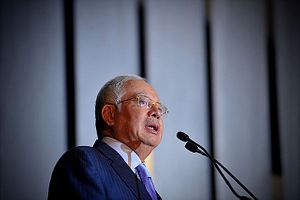Malaysia has cut its defense budget by over 2% for 2016 in yet another sign that budget constraints are undermining the country’s defense spending plans, Prime Minister Najib Razak revealed in an annual speech to the nation delivered October 23.
As I have noted before, Malaysian defense officials have repeatedly called for a boost to the country’s maritime and aerial capabilities in the face of rising threats ranging from piracy to terrorism and Chinese assertiveness in the South China Sea, which has begun to affect the country to a greater extent in recent years (See: “Malaysia Responds to China’s South China Sea Intrusion”).
But according to Najib’s annual budget speech delivered on Friday, the amount allocated for defense was just 17.3 billion ringgit ($4 billion), a decrease of 2.25% relative to the 17.7 billion ringgit allocated for 2015. The 2015 defense budget, by contrast, had constituted a 10% increase over 2014 levels.
The decrease is not surprising. Najib’s budget speech comes amid severe concerns about Southeast Asia’s third largest economy (See: “Interview: Malaysia’s Politics Amid the 1MDB Scandal”). Economic growth, already sluggish this year due to falling commodity prices, a weak ringgit, and a state investment fund scandal implicating Najib himself, is expected to slow to just 4% – 5% in 2016. Najib’s own political survival has been questioned, with a no-confidence vote tabled by the opposition in parliament (even though it is unlikely to succeed).
To be sure, the cut is not that drastic, and Malaysia’s defense spending as a percentage of GDP continues to hover at 1.5% as it has for years. Furthermore, Najib emphasized in his speech that the government was “committed to implementing capacity-building plans for the Malaysian Armed Forces (ATM) in stages.” His remarks confirm that existing procurement plans – including the acquisition of six littoral combat ship vessels and an air defense weapons system – would not be affected by the budget cut.
Yet concerns will continue to linger about Malaysia’s lagging capabilities in the face of the manifold threats the country faces, including piracy, smuggling, kidnapping, terrorism, illegal fishing, and encroachments by regional neighbors like Indonesia and the Philippines (See: “Malaysia’s Approach to the South China Sea: Playing it Safe”). Some new programs being mulled had already been shelved due to budgetary constraints, and the current economic environment only compounds existing problems in funding the country’s much-needed capability boosts.
































